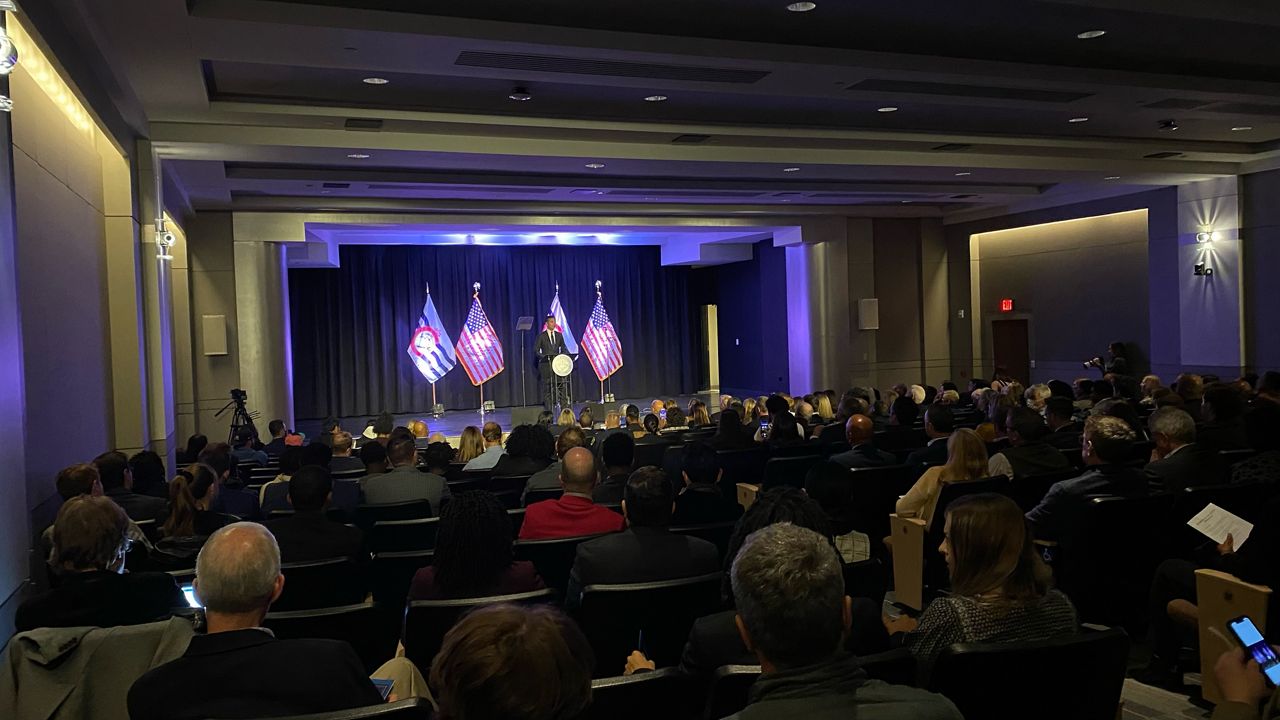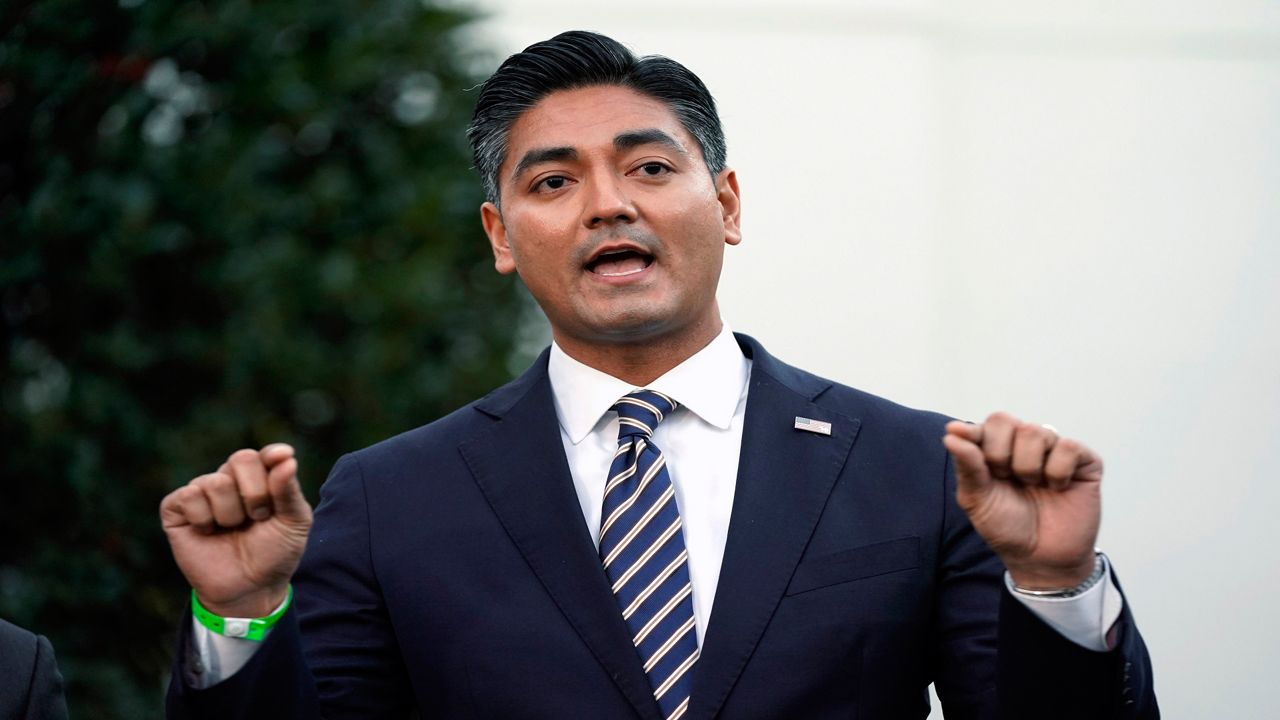CINCINNATI — Mayor Aftab Pureval used his first State of the City address as a platform to highlight the successes of his administration over the past nearly 11 months in office while underlining the potential harsh reality of years to come.
What You Need To Know
- Mayor Aftab Pureval delivered his first State of the City address on Tuesday
- The speech at Union Terminal outlined recent successes by the city, including 'unprecedented' levels of affordable housing, equitable development and fewer homicides
- He also mentioned to the crowd of about 250 people that Cincinnati is preparing for a $36 million operating deficit in the next two years
On Tuesday, he began his speech with the good, stressing that Cincinnati was in “strong” position overall. He outlined the millions of dollars in investments toward affordable housing and human services, and movement on long-planned transportation projects such as the Brent Spence Bridge Corridor.
Other accomplishments included a push for more equitable development across the city; new efforts to the effect of climate change; and the construction of bike and pedestrian safety features in 15 neighborhoods. A prime goal continues to be supporting the success of Black and Brown businesses.
Then he offered the bad, namely the $36 million operating deficit expected within the next two years. “And that gap will grow from there,” he said.
Pureval, who took office in January, called it a mayor’s “sacred duty” to “pull down the curtain and spark an honest conversation about where we are, where we’re heading and how we’re going to get there.”
“This moment of reckoning — this opportunity for introspection, celebration and planning — it’s emblematic of the very foundation upon which we’re built,” he said during his roughly 45-minute speech. “We are a people who come together to solve our problems, who pitch in together, and who rise up together.”

Pureval’s words produced applause, and even the occasional laugh, among a mostly favorable crowd of more than 250 residents, staff members, city employees and local politicos. Those in attendance included former mayors Mark Mallory and Charlie Luken, two former city managers and Procter and Gamble CEO Jon Moeller.
On Tuesday, Pureval stated his intent to select Moeller to lead a coalition of business, labor and community leaders to help the city face the challenges of the years ahead.
Once established, the commission will address three tasks “fundamental to Cincinnati’s future,” Pureval said. The group will review the city’s budget, analyze its economic development strategy, and survey the community and businesses to develop recommendations for future funding priorities.
Pureval described the process as similar to the city’s Smale Commission in the 1980s.
“Expenses are growing faster than projected revenues. And right now, with the position we’re in, we can’t just wait for those challenges to come,” he added.
The city managed to keep its operations afloat throughout the pandemic only because of “enormous support” from the federal government, Pureval said.
The new mayor and City Council benefited this term from an unexpected $11 million in American Rescue Plan Act (ARPA) funds. Those dollars helped jumpstart several projects, including pedestrian safety measures and the purchase of new emergency vehicles for the Cincinnati Fire Department.
Those dollars allowed the city to maintain basic services and build for our future, while also “[protecting] ourselves against the financial challenges ahead of us,” he said.
The mayor said the city also prepared for the “uncertain future” by putting money away. It brought the city up to its longstanding goal for financial reserves of 16.7% of general fund revenues.
These efforts wouldn’t have been possible, Pureval said, if his office, City Council and the administration didn’t put aside “egos” and “personal agendas.”
“Last November, voters made their voices heard,” he added. “They… mandated, for us to step up and chart a new future (and) to change the culture in City Hall; to work as a unified body for the common good, to have our debates and disagreements out in the open; and to implement a comprehensive plan to build a bright, equitable future for Cincinnati.”
Shortly after being elected, Pureval and his transition team developed comprehensive plans for four key areas: economic recovery and equity, affordable housing, public safety and climate action.
So far this term, the city worked with REDI and JobsOhio to attract or keep more than 1,000 jobs, while creating or retaining another 763 through in-house economic development efforts, Pureval said. He noted progress toward helping more minority-owned businesses capable of generating $1 million or more a year in revenue.
Efforts taken by Pureval and members of City Council have resulted in “unprecedented action” on affordable housing, the mayor said. Financial incentives from the city led to the creation or renovation of 417 units of affordable housing this year, the mayor said. He mentioned that nearly 400 of them are at or below 60% the Area Median Income.
Pureval also used his speech to announce plans to reform land use in Cincinnati to right-size the housing supply, particularly in middle or low-income neighborhoods. His administration is also working to implement a new tiered tax abatement plan to make the process more accessible, he said.
“Because of this (current system), a city tool to support our residents and improve aging housing isn’t working as well as it can,” Pureval added.
A common talking point throughout the night was the city’s commitment to public safety. Pureval commented that homicides are down 16.7% citywide compared to last year. In an effort to further shrink those numbers, he’s proposing two new pieces of legislation to counteract that. One of the city laws would prohibit people convicted of domestic violence from ever legally possessing a gun. The other focuses on requiring the safe storage of firearms.
“What we all do here, it isn’t just about next year. It isn’t about the next 10 years,” Pureval said to close his speech. “We have the power to shape this city’s future for generations to come, and this is the moment when we must step up and take action.”



